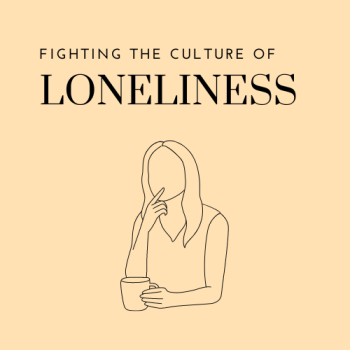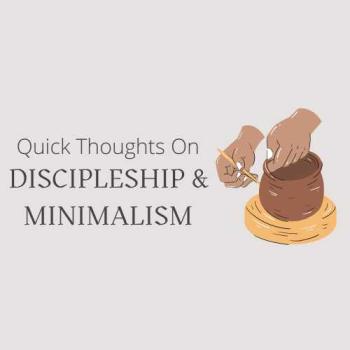
It isn’t possible for Christians today to follow Jesus while being willfully absent from a community of believers, and yet many of our Church practices developed over the last fifty or more years seem to act as if that were the case. As faithful followers of Jesus, we need to lean back into those commands of community and togetherness, realizing they are a gift and not a burden.
The Ditch We Veer Towards
In their book Misreading Scripture With Western Eyes, Brandon J O’Brien and E. Randolph Richards provide a metaphor that I believe will be helpful in setting the stage. The metaphor is this: life is sometimes like a path you are walking, with a ditch on the left and a ditch on the right. For those who are veering steeply off to the right, the best command to give them is “go left”. For those veering off to the left, the command is “go right”.
The idea is that these two commands “go left” and “go right” are not contradictory, they are simply contextual based on the need of the hearer.
Thinking about life this way can sometimes help us understand certain commands of Scripture.
For example, take the often-quoted Proverbs 26:4, which says, “Do not answer a fool according to his folly, or you yourself will be just like him.” That seems straight forward enough, until you read the very next verse, which says, “Answer a fool according to his folly, or he will be wise in his own eyes.”
Do these proverbs contradict each other?
At first, they would seem to, but I don’t think that’s really the case.
You see, true wisdom isn’t in knowing the proverbs, but knowing the time and place when each proverb applies. Bringing it back to our metaphor, wisdom is knowing to whom to say “go left” and to whom to say, “go right”.
Here’s the thing: our wider, Western, Church culture veers steeply off to the ditch of “individual relationship with God” often downplaying or even forsaking community with other believers. Because of our own tendencies towards individualism, we need more voices and commands that draw us back to the narrow road that holds community and individualism in balance.
My Journey
Over ten years ago I came to know the saving grace of Jesus Christ. Nearly that entire time, the pastors in my life had urged myself and those around me to read the Word daily, to spend time alone in prayer, and to have a very personal relationship with God.
I am incredibly grateful and humbled for this foundation in my faith, and I praise the Lord for those who’ve gone before me and raised me up. Today, I do truly have a deep and personal relationship with God and much of the credit comes to that consistent urging to spend time alone with the Lord daily.
And yet, like any child growing up, age and maturity has not only cultivated gratefulness in me, but also has led to reflection on what I’ve been taught and the areas of deficit in those teachings. To say it another way: I realized I was veering heavily to a ditch on the side of the road and, looking around, I noticed that I wasn’t alone.
For me and many of those around me, I realized that I’ve focused so heavily on my quiet time with the Lord, my personal relationship with Him, that I never fully learned that relationship with others in the body of Christ isn’t just a nice addition, but actually equal in importance (if not more important) than my time alone with Him.
I know at first blush that may seem like heresy (what could be more important than my personal relationship with Jesus?), and please know I don’t want anyone to stop having alone time with God. Just hear me out for a moment, or actually, hear Jesus out.
After teaching his disciples and eating the last supper with them, Jesus goes off to the Garden of Gethsemane to pray before he would be betrayed and crucified. John records his entire prayer in John 17, and I recommend you pause and go read the chapter (you can find it here).
There is much that can be said about Christ’s prayer in the garden, but I remember reading it a few years back the words brought me to tears. Why? Because I realized that I wasn’t fulfilling what Christ had been praying for. Jesus’ prayer for me wasn’t that I would have a solo relationship with Him, but that I would be one with other believers. In fact, he prayed we would have such a oneness with one another that he equated it how He and the Father were one (John 17: 20-21)
Jesus Christ, knowing he was about to die, did not pray that we would have individual relationships with him, but that we would have relationship with one another.
But I rarely live out that prayer, and you likely don’t either. When was the last time you sat next to someone in church and though, “I should be as united with them as Jesus is with the Father”?
I never used to think that way, and that was a serious problem.
Before we get off track, let me clarify exactly what I’d like to say in this piece: We must pursue personal intimacy with God, but we cannot rightly be intimate with God if we are not in deep relationship with His people.
That’s the big lie I was inadvertently raised on: that I could have a personal relationship with God absent of relationship with God’s people. Instead, the opposite is true: we grow in our personal intimacy with God as we grow in personal intimacy with God’s people.
Optional Community
We live in a church culture where we often believe that community is optional. Don’t get me wrong, I know many of us would say differently if asked directly. But just look at how we spend our time, our money, and our mental energy.
Maybe you read your Bible every day, but do you see your brothers and sisters in Christ every day? Maybe you talk to the Lord every day, but do you reach out to a fellow believer every day? Maybe you ask the Lord what you can do for him every day, but do you ask another believer what you can do for them every day?
For me and my story, I realized a deep truth that I had missed even after walking with the Lord for nearly a decade: although there are amazing blessings that come from alone time with the Lord and I should pursue that earnestly, it’s impossible to live the life God has called me to if I forsake deep, intimate, relationship with those in the Church.
To be clear, I always had other believers in my life. My wife and I often attended studies or small groups, and by the standards of most people around me we were “doing life together” with other Christians. The thing is, the bar set by those around me was pretty low. “Doing life together” looked a lot like going to a weekly service, attending a small group and… yeah… that’s about it.
Reading the Scriptures raises the bar though… by a whole lot.
Based on the Scriptures, I should be willing to share all I have with brothers and sisters in need (1 John 3:17), be willing to confess my sins to a brother or sister in Christ (James 5:16), never speak evil of a brother or sister in Christ (James 4:11), be willing to confront a brother or sister in love (Matthew 18: 15-17), meet often (if not daily) with other believers (Acts 2:46), lay down my life for a brother or sister (John 15:13), and so much more.
I mean, Jesus himself does not say that people will recognize a true believer by their love for God (how would you even see that?), but instead he said, “By this everyone will know that you are my disciples, if you love one another,” (John 13:35, emphasis added).
Honestly, there is far more teaching from Jesus and the writers of the New Testament on our relationship to one another and our corporate relationship to God than there is on individual relationship with God (though the Bible teaches this too!). However, if we listened to many sermons taught in our Western Churches or watched many of our lives, we would think that fellowship was optional or a distant second to personal time with the Lord.
We need to correct our course, not forsaking our personal relationship with Jesus one bit, but instead emphasize the need for community the way Jesus himself does.
Why Are We Off Course?
Before I dive into how we can correct the course we are on, it’s worth mentioning some of the factors that keep us from emphasizing community and fellowship the way we should. Please note each point I’ll make below could be its own column (and perhaps should be) and they will be vastly oversimplified for this medium.
So, some of the reasons we struggle to engage in deep community are…
- People have hurt us: our real pain from relationships with other believers can turn us away from pursuing deep relationships again
- We don’t feel a need: With access to sermons, worship music, social media, and all the Bible knowledge we could want, we don’t feel a need for Biblical community
- We adopt the culture around us: the United States is an incredibly individualistic culture, and we adopt that into the Church, falling into the “patterns of the world” (see Romans 12:2)
- We’re too busy: Community takes time and effort, and our past experiences have taught us that in community we give lots of ourselves away and get nothing in return. To relax from our crazy schedules, we turn to Netflix and TikTok, not other believers.
Again, these are deeply oversimplified (each worthy of their own column) and they are also personal to my experiences, but perhaps some of this resonated with you. Knowing why we aren’t diving deep into relationships with others can help us each figure out the steps we need to take in order to obey our Lord and Savior and love those in the church around us.
Getting On Track
I don’t have all the answers, but I’d like to share what I’ve been doing recently in order to correct where I’ve gone astray, and dive deeper into relationships. Although far from perfect, my family and I have opened up our home and we lead people into community and fellowship each Sunday night. In that setting we commune with one another and with the Father. We eat, we pray, we read Scripture and teach one another, we sing hymns, and we watch the Lord bring us together.
It’s amazing and has deepened my own intimate walk with Christ as well others.
So, what do I recommend for those of us currently lacking community?
Pray
Yes, the first step to community is a step of personal intimacy with the Father (I told you they were interconnected!). For me, I began by asking the Lord to change my heart so that I thought of my brothers and sisters in Christ as genuine family members. If the Lord doesn’t move in our hearts, nothing else matters.
Open Up Your Home
I like being alone, and I think of my home as my sanctuary. Until a few years ago, I thought of hosting others as a chore, and I kind of dreaded it.
When I moved my focus from myself to others, however, I realized that opening up my little house, filled with messy toys and young family craziness, is an act blessed by God. Invite people over often, and not always as planned or scheduled events. You heard someone had a bad day? Invite them over and make them something special to eat or drink.
And when they come over, treat them as family. Let them help pick up and do dishes while you chat, feed them whatever they’d like, and hold nothing back.
Listen and Speak
Around other believers, try to listen as much (or more) than you speak. This is especially true now when so many of us are only ever “heard” on social media. Be curious about someone else’s life and experience, and ask questions! Then, while they’re talking, don’t think about what you will say. Just keep quiet and listen.
When it comes time to speak, do so with humility and vulnerability. Open up your heart, knowing that the Lord guards it.
Read Scripture Together
I’ll write a column about this one day, but for now suffice to say that we don’t fully understand Scripture until we read it with others.
Jesus himself, though often going to pray alone, is never recorded as having read Scripture alone. Instead, he read it in the synagogue with other Jews. Church life was like this too, until a few hundred years ago when Bibles and literacy became more common. Still, for the first 1500 years or so of the Church, corporate reading of Scripture was all there was. It’s a blessing to be able to open our personal Bibles and read when no one is around, but it becomes less of a blessing when we allow that to become an excuse to keep us from a historical church of reading together.
Commit to Forever
Growing up, I remember people ahead of me in life often talking about the “throw away” culture being the cause of why marriages end instead of being worked on by those people involved. The problem is, the church has been “throwing away” relationships for generations now, splitting over this or that, moving from one church to another because of preference, essentially telling the Lord that “I’ll love your family… to a point” while expecting God’s own grace to be without end.
To put it another way: you and I will stay at a Church provided we like the music, the teaching, the childcare, and agree with all their financial decisions, otherwise we’re taking our tithe and monthly attendance elsewhere. Then we look to God and expect His forgiveness of our sins to be without end.
That’s hypocrisy and it must end.
Commit to loving other believers no matter their political party, music preference, demeanor, or anything else.
Final Thoughts
It’s a good thing that we have emphasized our individual relationship with Jesus and have cultivated habits such as our daily quiet time. However, we may have forgotten the deep seriousness that the Scriptures put on relationships with other believers.
1 John 3:10 reads “This is how we know who the children of God are and who the children of the devil are: Anyone who does not do what is right is not God’s child, nor is anyone who does not love their brother and sister.” Our quiet time with Jesus, though vital, is not a sign that we’re saved. Instead, over and over, the Scriptures point us to love one another and to know that our love for one another is a sign of our salvation.
Ask yourself today, right now even, does your love for other believers prove you to be a follower of Jesus Christ? Is it sacrificial, willing to give up your bank account for the good of others? Can it see past political, generational, racial, or ethnic lines? Do people have to agree with you to be loved by you?
Let’s confess our sins to the Lord and ask him for a spirit of love for his children, and I believe He will be faithful to provide. Let’s look around and love our fellow believers radically, ensuring no one has needs that go unmet, whether financial, spiritual, or emotional.
Let us show ourselves to be what we claim: Children of God.
Share this post with a friend in your community and let it spark conversation and deeper relationship!
For more content like this, check out the Living Room Disciple Podcast here, or check out our website.













